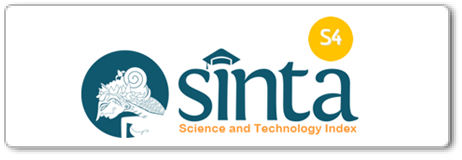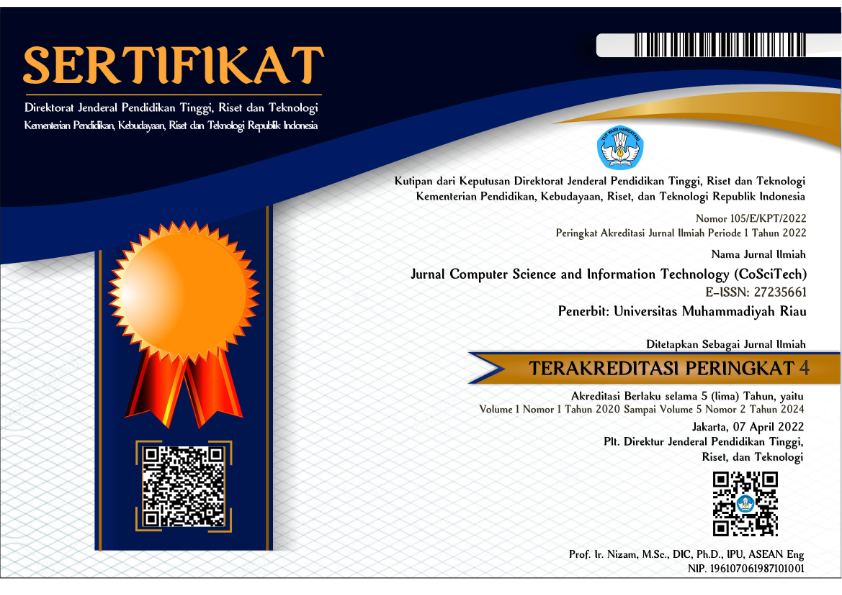Studi Literatur Penerapan Clustering Data Numerik Untuk Sistem Rekomendasi Berbasis Collaborative Filtering
DOI:
 https://doi.org/10.37859/coscitech.v5i2.7087
https://doi.org/10.37859/coscitech.v5i2.7087
Abstract
The recommendation system assists users in finding items that match their preferences from the large number of items that exist. Recommendation systems have two types of approaches: a content-based approach and a Collaborative Filtering (CF) approach. CF approaches can be categorized into model-based and memory-based CF. The problem faced in the CF method is the complexity or long computation time due to the large data dimensions, data sparsity, and accuracy. In overcoming the problems mentioned, several data mining and machine learning techniques are used in collaboration with traditional CF methods. Many studies are using numerical data clustering techniques on CF-based recommendation systems. However, to date, there is still no literature review regarding the implementation of clustering techniques to numerical data to develop recommendation system methods based on the CF approach. Therefore, a literature study was carried out regarding the implementation of clustering techniques to numerical data to develop recommendation system methods based on the CF approach using 20 related literature. As a result, the various clustering techniques used can be grouped into K-Means, Subspace Clustering, Bi-Clustering, Canopy Clustering, K-Medoids, Evolutionary Heterogeneous Clustering, Fuzzy, Self-Constructing Clustering (SCC), and Agglomerative Hierarchical Clustering (AHC). K-Means and Fuzzy clustering techniques are the most commonly found in the literature.
Downloads
References
[2] Afoudi, Y., Lazaar, M., and Al Achhab, M., 2021, Hybrid recommendation system combined content-based filtering and collaborative prediction using artificial neural network. Simulation Modelling Practice and Theory, 113, p. 102375, doi: https://doi.org/10.1016/j.simpat.2021.102375.
[3] Juan, W., Yue-xin, L., and Chun-ying, W., 2019, Survey of recommendation based on collaborative filtering. Journal of Physics: Conference Series, 1314(1), p. 012078, doi: https://doi.org/10.1088/1742-6596/1314/1/012078.
[4] Chen, R., Hua, Q., Chang, Y.-S., Wang, B., Zhang, L., and Kong, X., 2018, A survey of collaborative filtering-based recommender systems: From traditional methods to hybrid methods based on social networks. IEEE Access, 6, pp. 64301-64320, doi: https://doi.org/10.1109/ACCESS.2018.2877208.
[5] Chen, J., Zhao, C., Uliji, and Chen, L., 2020, Collaborative filtering recommendation algorithm based on user correlation and evolutionary clustering. Complex & Intelligent Systems 6, pp. 147-156, doi: https://doi.org/10.1007/s40747-019-00123-5.
[6] Son, N. T., Dat, D. H., Trung, N. Q., and Anh, B. N., 2017, Combination of dimensionality reduction and user clustering for collaborative-filtering. The 2017 International Conference on Computer Science and Artificial Intelligence (CSAI /17), Jakarta, Indonesia, pp. 125-130, doi: https://doi.org/10.1145/3168390.3168405.
[7] Sinaga, K. P. and Yang, M.-S., 2020, Unsupervised K-means clustering algorithm. IEEE Access, 8, pp. 80716-80727, doi: https://doi.org/10.1109/ACCESS.2020.2988796.
[8] Cheung, Y.-m. and Jia, H., 2013, Categorical-and-numerical-attribute data clustering based on a unified similarity metric without knowing cluster number. Pattern Recognition, 46(8), pp. 2228-2238, doi: https://doi.org/10.1016/j.patcog.2013.01.027.
[9] Agrawal, S. S. and Bamnote, G. R., 2016, Implementing and evaluating collaborative filtering (CF) using clustering. The First International Conference on Information and Communication Technology for Intelligent Systems, Ahmedabad, India, pp. 153-163, doi: https://doi.org/10.1007/978-3-319-30927-9_16.
[10] Masyhur, F., 2017, Penelitian e-Government di Indonesia: Studi Literatur Sistematis dari Perspektif Dimensi Pemeringkatan e-Government Indonesia (PeGI). Jurnal IPTEKKOM (Jurnal Ilmu Pengetahuan & Teknologi Informasi), 19(1), pp. 51-62, doi: https://doi.org/10.17933/iptekkom.19.1.2017.51-62.
[11] Treerattanapitak, K. and Jaruskulchai, C., 2012, Exponential fuzzy C-means for collaborative filtering. Journal of Computer Science and Technology, 27, pp. 567-576, doi: https://doi.org/10.1007/s11390-012-1244-x.
[12] Xu, B., Jiajun Bu, Chun Chen, and Deng Cai, 2012, An exploration of improving collaborative recommender systems via user-item subgroups. The 21st International Conference on World Wide Web (WWW /12), Lyon, France, pp. 21-30, doi: https://dl.acm.org/doi/abs/10.1145/2187836.2187840.
[13] Birtolo, C. and Davide, R., 2013, Advances in clustering collaborative filtering by means of fuzzy C-means and trust. Expert Systems with Applications, 40(17), pp. 6997-7009, doi: https://doi.org/10.1016/j.eswa.2013.06.022.
[14] Son, L. H., 2014, HU-FCF: a hybrid user-based fuzzy collaborative filtering method in recommender systems. Expert Systems with Applications: An International Journal, 41(15), pp. 6861-6870, doi: https://doi.org/10.1016/j.eswa.2014.05.001.
[15] Ghazanfar, M. A. and Prügel-Bennett, A., 2014, Leveraging clustering approaches to solve the gray-sheep users problem in recommender systems. Expert Systems with Applications, 41(7), pp. 3261-3275, doi: https://doi.org/10.1016/j.eswa.2013.11.010.
[16] Koohi, H. and Kiani, K., 2016, User based Collaborative Filtering using fuzzy C-means. Measurement, 91, pp. 134-139, doi: https://doi.org/10.1016/j.measurement.2016.05.058.
[17] Katarya, R. and Verma, O. P., 2016, A collaborative recommender system enhanced with particle swarm optimization technique. Multimedia Tools and Applications, 75, pp. 9225-9239, doi: https://doi.org/10.1007/s11042-016-3481-4.
[18] Liao, C.-L. and Lee, S.-J., 2016, A clustering based approach to improving the efficiency of collaborative filtering recommendation. Electronic Commerce Research and Applications, 18, pp. 1-9, doi: https://doi.org/10.1016/j.elerap.2016.05.001.
[19] Koohi, H. and Kiani, K., 2017, A new method to find neighbor users that improves the performance of collaborative filtering. Expert Systems with Applications, 83, pp. 30-39, doi: https://doi.org/10.1016/j.eswa.2017.04.027.
[20] Ifada, N., Prasetyo, E. H., and Mula’ab, 2018, Employing sparsity removal approach and Fuzzy C-Means clustering technique on a movie recommendation system. The 2018 International Conference on Computer Engineering, Network and Intelligent Multimedia (CENIM), Surabaya, Indonesia, pp. 157-162, doi: https://doi.org/10.1109/CENIM.2018.8711270.
[21] Mirbakhsh, N. and Ling, C. X., 2018, Leveraging clustering to improve collaborative filtering. Information Systems Frontiers, 20, pp. 111-124, doi: https://doi.org/10.1007/s10796-016-9668-4.
[22] Chen, J., Uliji, Wang, H., and Yan, Z., 2018, Evolutionary heterogeneous clustering for rating prediction based on user collaborative filtering. Swarm and Evolutionary Computation, 38, pp. 35-41, doi: https://doi.org/10.1016/j.swevo.2017.05.008.
[23] Kant, S. and Mahara, T., 2018, Merging user and item based collaborative filtering to alleviate data sparsity. International Journal of System Assurance Engineering and Management, 9, pp. 173-179, doi: https://doi.org/10.1007/s13198-016-0500-9.
[24] Zarzour, H., Faiz Maazouzi, Mohamed Soltani, and Chaouki Chemam, 2018, An improved collaborative filtering recommendation algorithm for big data. The 6th IFIP International Conference on Computational Intelligence and Its Applications (CIIA 2018), Oran, Algeria, pp. 660-668, doi: https://doi.org/10.1007/978-3-319-89743-1_56.
[25] Li, J., Zhang, K., Yang, X., Wei, P., Wang, J., Mitra, K., and Ranjan, R., 2019, Category preferred canopy–K-means based collaborative filtering algorithm. Future Generation Computer Systems, 93, pp. 1046-1054, doi: https://doi.org/10.1016/j.future.2018.04.025.
[26] Deng, J., Guo, J., and Wang, Y., 2019, A Novel K-medoids clustering recommendation algorithm based on probability distribution for collaborative filtering. Knowledge-Based Systems, 175, pp. 96-106, doi: https://doi.org/10.1016/j.knosys.2019.03.009.
[27] Garanayak, M., Mohanty, S. N., Jagadev, A. K., and Sahoo, S., 2019, Recommender system using item based collaborative filtering (CF) and K-means. International Journal of Knowledge-based and Intelligent Engineering Systems, 23(2), pp. 93-101, doi: https://doi.org/10.3233/KES-190402.
[28] Ifada, N., Fitriantama, M. N., Sophan, M. K., and Wahyuni, S., 2020, Collaborative Filtering Item Recommendation Methods based on Matrix Factorization and Clustering Approaches. The 10th Electrical Power, Electronics, Communications, Controls and Informatics Seminar (EECCIS), Malang (Online), pp. 226-230, doi: https://doi.org/10.1109/EECCIS49483.2020.9263450.
[29] Andra, D. and Baizal, A., 2022, E-commerce Recommender System Using PCA and K-Means Clustering. Jurnal RESTI (Rekayasa Sistem dan Teknologi Informasi), 6(1), pp. 57-63, doi: https://doi.org/10.29207/resti.v6i1.3782.













